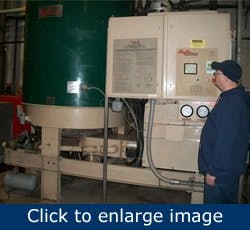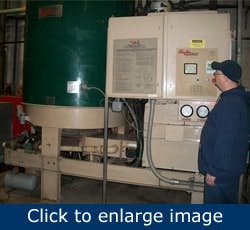Steam generators enable efficient food processing and freezing
When my great grandfather, Charles F. Seabrook, purchased the South Jersey farm from his father in 1912, he wanted Seabrook Farms to be a pioneer in the growing, storing, and selling of fresh healthy vegetables.
He made his farm one of the first ever to use overhead irrigation and gasoline-powered tractors and then expanded the farm to include a canning and freezing facility. And yet, the bottom line was always the same: provide consumers with the best quality, freshest-tasting vegetables. Today, the Seabrook family grows, processes, and freezes 150 million lb of vegetables from the Garden State each year, still operating with the same vision.
We’re now in our fourth generation. What keeps us in business is the will to continue to get better at what we’re doing. Being able to change is the best thing you can do for your company. When I look at how the oldest companies survive, it really is all about change. Back in the old days, we had about 7,000 employees. We’re now providing even more of the same products and services than ever before with 450 employees. And technology made working in the fields more efficient and productive when we replaced the old mule-drawn farm equipment with the first Caterpillar tractors.
Ahead of the curve and the competition
To most shoppers along the East Coast, Seabrook Farms is known for crisp frozen green beans and a frozen creamed spinach. But a large part of the business at Seabrook is actually the processing and freezing of vegetables for other manufacturers. In 1978, we decided it was time to reinvigorate that pioneering sprit that kept the Seabrook name alive. To meet higher demand and increased volume, the company would have to find ways to process and freeze higher quantities faster and more efficiently.
When we took a hard look at operating costs and efficiencies, we determined that a major expense was the boiler. Our business relies a great deal on that boiler for flash steaming, cooking, and freezing. And with the old one we were losing a lot of time and money. First, a fire tube boiler takes a very long time to start up. Walking in on Monday morning and firing up the boiler meant hours and hours of non-productivity.
Another option would have been to keep the boiler running through the weekend without actually using it, but New Jersey law required a certified boiler operator to be with the boiler at all times that it is running. Both options seemed to be a waste of time and money.
Steam generation
Wes Seabrook, fourth generation of the Seabrook’s food-processing and freezing family, is all about change.
We bought two SigmaFire steam generators from Clayton Industries (www.claytonindustries.com). These steam generators could bring steam up to the right temperature so quickly that the quality of the fresh vegetables never became compromised. With the steam generators, fuel costs are lower, startups are immediate, and the needed vegetable steam temperature of 200 °F can be achieved in 2 min.
The main advantage is efficiency. For more than 30 years, we haven’t had the downtime while the boiler starts. And, if you think about it, we saved the $1.5 million we would have paid for a boiler attendant over the weekends (48 hrs at $20/hr, for 52 weeks over 30 years).
In addition, the steam generator can handle load shifts almost instantaneously, so we can process a small quantity of corn and immediately follow up with a large quantity of beans. And we like the Clayton Industries steam generators because they’re explosion-proof, which provides added safety.
About 10 years ago, we took another long look at our business and decided what could be done to move ahead of the curve. Because the success of the freezing and packing business was continuing to move forward, the natural next step was to upgrade once again.
Clayton reviewed our existing equipment and designed a plan to meet our future needs. We upgraded our existing steam generators’ control systems. The upgrade consisted of a retrofit of existing equipment. We’ve got all of the bells and whistles of the new equipment, but we’re still using our 1978 boilers.
Wes Seabrook is vice president of engineering at Seabrook Brothers and Sons (www.seabrookfarms.com) in Seabrook, New Jersey. Contact him at (856) 455-8080 or [email protected].

